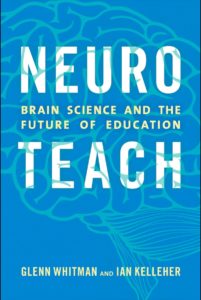
After you’ve read the book, keep practicing with MBE research and strategies with the Neuroteach Global® platform.
Praise for NeuroTeach
“I wanted to reach out to share with you how your materials are being used in higher education. Our students love your book [Neuroteach] as well as the online resources. It is great when I hear from my doctoral students at the beginning of the quarter since so many tell me they actually read your entire book the first week of class or have already shared many of your resources with their colleagues.”
Dr. Kristen Betts, Drexel University
“This book is a must read for any teacher or school leader. This is both a summary of the latest Mind,Brain, Education research andalso a great introduction for those who want to dig deeper, The book is not only filled with suggestions for things teachers (and parents) can do to help students learn but also with suggestions for how schools can really prepare their students for the world they will live in and not the world their grandparents lived it. I cannot recommend this book highly enough.”
Kevin McShane
“Neuroteach offers a readily accessible and much needed synthesis of mind, brain, and education (MBE) science for educators committed to professional practice. From the “Top Twelve Research-Informed Strategies Every Teacher Should Be Doing With Every Student” (and its inverse, “The Unconscionable List [AKA The Despicable Baker’s Dozen]: Things a Teacher Should Never Do Again”) to a carefully delineated proposed “Professional Pathway for Teachers Informed by Mind, Brain, and Education Science,” Whitman and Kelleher offer research, insight, and immediately practical applications that every educator needs to know, and their students deserve them to know. Neuroteach should be the professional book study of the year!”
Kim Carter
“While highlighting classroom teachers as the experts on learning, Kelleher and Whitman underscore the importance of utilizing the strongest evidence in mind, brain and education science to inform one’s practice.”
Vanessa Rodriguez, (@teachingbrain), teacher, researcher and author of The Teaching Brain: An Evolutionary Trait at the Heart of Education
“Neuroteach combines important lessons from both cognitive psychology and neuroscience to draw useful, practical conclusions that will clarify not just what teachers should do in the classroom, but better understand the complexities of the science of learning.”
David Didau, (@LearningSpy), author of What if Everything You Knew About Education Was Wrong? and The Secret of Literacy
“This level of respect for the process of teaching and learning is sustained throughout the guide, providing its distinct voice and strengthening the authors’ call to incorporate neuroscience with pedagogy.”
Mariale Hardiman, (@MarialeHardiman), co-founder and director of the Johns Hopkins University School of Education’s Neuro-Education Initiative and author of The Brain-Targeted Teaching Model for 21st Century Schools
“I do think you have successfully achieved your goal in making Neuroteach a phenomenal teacher resource that simplifies research informed strategies. It brings all the research together in a concise and informative way with easy to understand steps to implement in the classroom.”
Shawana Angelo
“Neuroteach provides practical guidance about using theoretically sound research-based principles in the design of schools, classrooms, and work with individual students. ”
Judy Willis, (@judywillis), Research Strategies to Ignite Student Learning: Insights from a Neurologist and Classroom Teacher
“To my knowledge there is no school in America, and no two educators more completely qualified and effective at translating the remarkable impacts of neuroscience down from the 30,000 foot level to ‘what can we do in class tomorrow.’”
Grant Lichtman, (@GrantLichtman), author of #EdJourney: A Roadmap to the Future of Education
